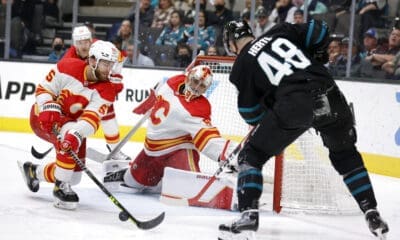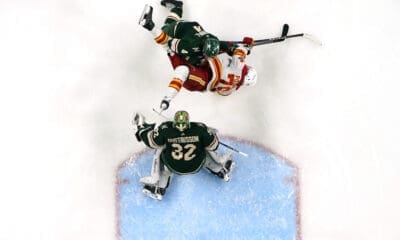Calgary Flames
The Other Score Effect: Making Your Own Narrative

The term "score effect" is a statistical term that refers to how teams play differently when they're ahead or behind. It's basically the reason that CORSI and Fenwick should be looked at EV tied only, for if a team is ahead they'll play more conservatively and if a team is behind they'll play more aggressively.
But there's another "score effect" I'd like to look at- how scoring changes your perception of a game.
Imagine you’re watching a hockey game. David Moss is absolutely dominant. He’s got six shots on goal, always seems to make sure his line is in control of the puck, is dictating the flow of the game. Moss is a Mossnster.
In the same game, Anton Babchuk scores twice with an assist, has two total shots on goal, and consistently fails to backcheck effectively. Who do you remember?
The answer should be David Moss. Unfortunately, that's probably not what will happen. We don't remember the small consistently recurring things. We remember the goals, whether "earned" or not.
Watch the highlights of a hockey game. Chances are someone will take what is basically a routine shot- not a shot following a fancy move or big hit- and the goalie- for whatever reason- will fail to make a save. The commentator will chalk this up to a player taking a great shot, rather than a goalie failing to play properly (unless, of course, it's Luongo- especially if he's on his belly).
You'll hear a phrase like "seeing eye shot" or something equally inane. Someone might mention that "if only he played like this every game" despite the fact the actual play on the ice is exactly like every other game he's played this season. The only difference is a little bit of luck.
It doesn’t just happen on a game-game basis though. It can happen on a full season basis and does quite frequently. Look at Corey Perry and his 50 goals this season. His play on the ice was no different, but because of a slightly higher shooting percentage and the timing of some of the goals he’s suddenly Hart Trophy Winner Corey Perry (TM). The same thing applies to the Sedin’s, who rely on exceptionally cushy zone starts to score their absurd amounts. This isn’t to say any of these players aren’t very good- but are they really better than they were when they didn’t get those zone starts or bounces? No.
Instead, a legitimately elite player, like Alexander Ovechkin, who suffers from poor luck, like Alexander Ovechkin this past season, is talked about as though he's lost his game- "he's not the same player". We see that he "only" scored 32 goals, and don't look at the real play on ice. His (lack of) scoring makes him look no longer elite.
I’ll admit to being guilty of this too- if you recall I was a HUGE proponent for Corey Perry for the Hart. Granted, that may have been influenced by his main competition being Daniel Sedin, but still. The worst is when we start using these scores to define players: 40 goal guy, 50 goal star, 20 goal scorer. Such titles ignore reality at best, insult it at worst.
This is the problem that occurs when people say "I don't need fancy stats, I just watch the game". Because while you might be watching the game, you're only remembering certain events. And over the course of a season, hockey is greater than those events. Hockey is the events you don't remember.
by Arik Knapp









